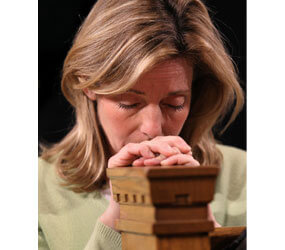WASHINGTON – Sitting on the floor in a side chapel in the Basilica of the National Shrine of the Immaculate Conception, Lillian Zhao knew that what she was part of was unlike anything she had ever seen in her native China.
Zhao, a sophomore international student from China attending Fordham University in New York, was among thousands of people, most of them Catholic, jammed into the massive church. They, like Zhao, had gathered the evening of Jan. 23 to pray for an end to abortion.
The Mass opening the traditional overnight National Prayer Vigil for Life in the basilica’s crypt was minutes away and Zhao was taking mental notes.
She said she expected the next day’s March for Life to the Supreme Court to call for an end to legalized abortion would be just as energizing.
“This is my first March for Life,” she said. “I’m very pro-life. I’m against abortion.
“I don’t think it’s a good idea,” added the young student who is considering becoming a Catholic. “In China, the abortion situation is getting worse. I want to learn more about what Americans are doing to stop abortion.”
Zhao said she found the mix of religion and political activity an interesting combination. It was something she said she hoped to share with friends and family back home, hoping to inspire them to begin to work to end legalized abortion in China.
“We need more brave people (in China),” she said. “If we don’t have brave people, you can’t make changes.”
The actions of young people such as Zhao were held up as an example of the pioneering leadership in the pro-life movement by people in the congregation as well as by Cardinal Daniel N. DiNardo of Galveston-Houston, the main celebrant of the Mass.
Former House Speaker Newt Gingrich was among those who were impressed with the turnout of young people. He told Catholic News Service that the vigil Mass was the first he attended even though his wife, Callista, had sung in the basilica choir for the liturgy for 15 years.
“It’s remarkable, particularly to see the number of young people,” Gingrich said. “They’re very energized.”
“I just want to let this evening wash over me, if you will,” he said.
Cardinal DiNardo, chairman of the U.S. bishops’ Committee on Pro-Life Activities, praised the young people gathered for the two days of events marking the 38th anniversary of the Supreme Court’s Roe v. Wade decision for being “unflagging witnesses to the inestimable worth of each human person.”
“The sad anniversary recalled each year on Jan. 22 has become an invitation to you, one that calls for prayer and vigiling, for marching and testifying and for a joyous love for human life that is unable to be defeated,” he said during his homily to the young people in attendance.
Returning home after the March for Life ends provides young people the opportunity to continue their pro-life witness to family and friends, both at school and at parishes, Cardinal DiNardo said.
“We are always in need of that conversion, that turning around that the kingdom of heaven invites,” he said. “There is always room for us to deepen our respect for the human person. Not only do we need to see each person in the light of the Gospel, but we also need the jolt from Christ Jesus to see every human person as light.”
The cardinal also called for a unified Catholic Church in the pro-life effort and urged the huge congregation to unite in the body of Christ in the Eucharist.
“If there is a place where our unity must shine it must be in this realm of laboring for the culture of life,” he said. “Anything else will compromise that culture.”
Citing Pope John Paul II’s 1994 encyclical, “The Gospel of Life,” which proclaimed the dignity of the human person, Cardinal DiNardo expressed concern that efforts to expand public funding of abortion continue and the conscience rights of health care workers and pharmacists who do not wish to participate in abortion procedures are eroding.
He also expressed hope that recently introduced legislation in the House of Representatives would become law. In particular, he cited three bills introduced Jan. 20:
– The Abortion Non-Discrimination Act, which would prevent governmental discrimination from forcing any health care entity to performing or participating in abortions.
– The No Taxpayer Funding for Abortion Act, which would enact the Hyde amendment which prohibits federal funding of abortion and the Hyde/Weldon amendment on conscience rights for health care workers into law for all federal departments and all avenues of federal funding.
– The Protect Life Act, which would apply long-standing federal policies on abortion funding and conscience rights on abortion to the Patient Protection and Affordable Care Act.
“These matters deal with public policy and they are issues in the public square in which you can participate,” Cardinal DiNardo told the congregation. “Advocacy on behalf of human life is an important dimension of our pro-life cause.”


